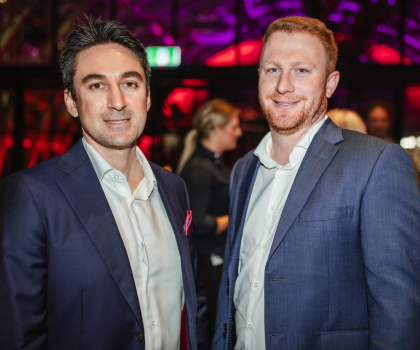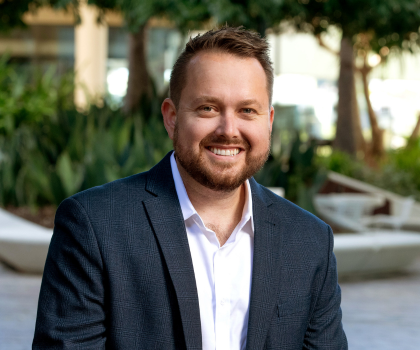
Pictured: Katie McRobert with constantly-in-zoom-background study buddy, Fezzik.
Katie McRobert graduated with her Master of Business Administration (MBA) in December 2020. We, the MBA Team sat down with Katie to talk about her position as General Manager at Australian Farm Institute ( AFI ), MBA journey and everything in between.
You are the General Manager for the Australian Farm Institute ( AFI ). What does this involve?
The Australian Farm Institute ( AFI ) is Australia’s only think tank dedicated to agricultural policy – which sounds niche, but in fact underpins economic and environmental decisions. Every single person is affected by agricultural policy - everyone has to eat, and farmers manage more than half Australia’s land. Good policy about food / fibre production and land stewardship ensures a viable, sustainable future for the Australian agricultural community which feeds us and our region.
Our mandate is to promote evidence-based policy solutions for agriculture. To meet this, we undertake topic-based research projects, publish a quarterly Journal, Occasional Papers and briefings, and hold events to canvass emergent issues. We work with a range of organisations across RDC (rural research and development corporations) and advocacy ecosystems, agribusiness, academia, and governments.
The AFI is a small but mighty team, so we all contribute to shared tasks and goals. As GM the bulk of my time is invested in the research programs, and in any given week I also manage projects, edit papers, assist with admin, deliver presentations, participate in or host workshops, conduct interviews … never a dull day!
In your opinion, what action is going to drive the most change for the Australian farming sector?
In responding to climate change impacts, farmers need to address the tangible – physical factors – and the intangible – politics and policy. The threat posed to farming by no water, or too much water, or fire, hail, cyclones etc. is clear. In addition, Australian agriculture is a trade-dependent industry. For better or worse, regulations made in Europe, or the US are always going to impact the way we farm here, which is why the team working on the Australian Agricultural Sustainability Framework has been closely following the MOU between the GRI and ISSB on sustainability standard-setting, as well as the emergence of the TNFD. Australian farmers face the dual challenge of dealing with severe and increasingly frequent climate impacts to the natural capital which produces food and fibre, along with navigating an increasingly complex trade and regulatory environment. I think the action which will drive most change in farming will be the voluntary adoption of an Australian-specific framework.
Have you witnessed a shift in how farmers are responding to the impacts of climate change?
Yes, definitely. Climate change has been a hot topic for the decade I’ve been involved in the industry, but the tone of discussion has shifted from scepticism on science to urgency of action. This is due in part to political change (the former government had struggled to mention climate and agriculture in the same breath) and largely to the leadership provided by the National Farmers Federation, particularly the current president and CEO who fought to change the industry narrative. In addition, the formation of Farmers for Climate Action in 2015-16 set a light on the hill. Alongside these advocacy shifts, the AFI has been consistently pushing strongly for evidence-based policy responses to climate change, for example noting that “Cohesive climate policy which actively seeks to address gaps is required to drive substantial investment in adaptable farming systems and low-emissions energy generation in Australia” in our 2019 report, ‘Change in the air’.
Which UN Sustainable Development Goal ( SDG ) are you most passionate about and why?
SDG 12 – Responsible production and consumption is the goal which resonates most with me, not least because the past two years of my working life have focused intently on developing the Australian Agricultural Sustainability Framework ( AASF ).
Through a personal lens, food waste of any kind is one of my biggest triggers. Our food is too cheap – or more accurately, is not valued. We constantly ask farmers to produce more with less (and cop the cost) yet throw an insane amount of food into landfill without thinking of the environmental, economic and social costs of this waste. With people in some supply chains desperate for reliable access to nutritious food, this behaviour is unconscionable. There should be no such thing as ‘waste’ food. Even the mankiest leftovers are fuel for compost which grows more food.
The AASF , like the SDG s, is intended to provide that ‘light on the hill’ which gets people all throughout ag value chains – from growers through processors and distributors to consumers – thinking about the choices we need to make to continue producing food and fibre within our sustainable limits.
SDG 12 doesn’t speak only to food of course, and production / consumption throughout our economy is well outside responsible limits to growth. It’s one of the few goals for which we as individuals can make daily choices to do better.
What is your favourite Griffith MBA memory?
The camaraderie built amongst participants in the Global Business Challenge – not just within our own team but also in the wider crew of other teams and Griffith staff – was very special. We definitely felt embraced as part of a creative, diverse, knowledgeable and supportive team. Lifelong friendships forged over brainstorms, diagrams, spreadsheets, sleepless nights, and high vis (with a special shoutout to Darrin, Winnie, Steffi, James and Mirela)!
Do you have any tips or advice to share with current MBA students or your former self?
Go easy on yourself, take the help that’s offered, make it your own. Undertaking an MBA is hard, and doing an accelerated version while balancing family, friends, work and life events is VERY hard. It’s not about excelling at every task, it’s about getting the most from the learning journey – sounds corny, but 100% true. So, pace it out, and go down those rabbit holes which will distract you in the reading, even if that means a few marks less. Your MBA is an important milestone – but what you LEARN, where that intellectual curiosity takes you, and who you go there with are the real goals.
How do you live a more sustainable lifestyle outside of the workplace?
For a start, no food goes in our rubbish bin, ever. Any inedible leftovers or overlooked carrots go first to the dogs or chooks - and if no good for them, then to one of many compost bins which feed into our modest vegie patch. I’ll be honest, the patch is not that productive (outside some spectacular silver beet) but the soil is *chef’s kiss*! We minimise use of energy-hungry appliances, for example focusing on insulation and window placement when we renovated to maximise our passive cooling/heating options. I’m a big fan of a small-footprint house (i.e., little building, big yard) as this provides choices in simpatico landscape/building design. A well-placed tree or pond is not only good for the soul but can also make a significant impact to your energy bill. I prioritise public transport over car use: fewer fumes, more reading time! And I have been an op shop addict since high school - then for the thrift, now for the enjoyment of the treasure hunt and to minimise my contribution to the textiles waste issue.
If you have a question for MBA Alumnus, Katie McRobert, we encourage you to connect on LinkedIn.
You may also like

Meet MBA Alumnus, Mitch Barlow
Mitch is the Principal Officer for Community Facilities Maintenance at Brisbane City Council, where he leads a team responsible for 700 facilities. In this interview, Mitch talks about disaster recovery to building relationships, how he ensures these facilities serve the community well.

Meet MBA Alumnus, Andrej Maletic
Since graduating, Andrej has created a values-driven venture known as Goraw desserts. Read what Andrej has to say about his entrepreneurial journey and what led him to pursue an MBA.

Meet MBA Student, James Hall
James is a proud Deputy Principal who recently commenced his MBA studies. In this interview, James talks about his teaching experience in a remote community and reflects on the first MBA course he completed.